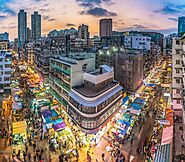-
About
- About Listly
- Community & Support
- Howto
- Chrome Extension
- Bookmarklet
- WordPress Plugin
- Listly Premium
- Privacy
- Terms
- DMCA Copyright
- © 2010-2024 Boomy Labs


Listly by Darcy Darling
The task of translating cultural expressions from Cantonese or Mandarin into English poses unique challenges. Hong Kong's translation services play a crucial role in bridging linguistic gaps and facilitating communication across diverse communities. However, certain cultural expressions inherent to Hong Kong's rich tapestry of traditions, customs, and colloquialisms present complexities that may be lost in translation.

"Ghost horse spirit," is a phrase often used in Hong Kong to describe someone who possesses a playful and mischievous demeanor, akin to a spirited ghost or a lively horse. This expression encapsulates the lively energy and cheeky charm of individuals who approach life with a sense of fun and adventure.

"Full but not hungry," is a colloquial Cantonese expression that reflects contentment and satisfaction. It describes the feeling of being physically satiated after a meal, yet still feeling emotionally fulfilled and content. This nuanced sentiment may be challenging to convey in English, as it encompasses both physical and emotional states of being.

"People of the wind and clouds," is a figurative expression used to describe influential and prominent figures in Hong Kong. It conveys the idea of individuals who are dynamic, powerful, and capable of shaping the course of events like the wind and clouds that sweep across the sky.

"Speak truth," is a colloquial Cantonese phrase used to emphasize sincerity and honesty in communication. It is often employed to underscore the authenticity and genuineness of a statement or assertion.

"All five internal organs complete," is a figurative expression used to signify overall well-being and good health in traditional Chinese medicine. It conveys the idea of holistic wellness, where each of the body's five essential organs - heart, liver, spleen, lungs, and kidneys - is functioning optimally.

"Hong Kong express delivery," is a term commonly used to describe the fast-paced lifestyle and efficient service culture in Hong Kong. It reflects the city's reputation for rapidity and efficiency in various aspects of daily life, including transportation, communication, and commerce.

"Drink a cup of tea," is a polite and indirect way of declining an invitation or request in Hong Kong culture. It is often used to gracefully refuse without causing offense or confrontation.

"People mountain, people sea," is a vivid expression used to depict crowded environments or bustling crowds in Hong Kong. It vividly captures the density and congestion of densely populated urban areas, where people are packed closely together like mountains and seas.

"Handsome guy" and "pretty girl," are colloquial Cantonese terms used to compliment someone's appearance in Hong Kong. They are commonly used to describe individuals who are attractive or good-looking, often in a casual and lighthearted manner.

These expressions are deeply rooted in Hong Kong's cultural heritage and carry layers of meaning that may be lost in just AI translation. With professional translation services in Hong Kong, skilled translators adeptly navigate these complexities to ensure accurate and culturally sensitive translations that effectively convey the essence of the original text.